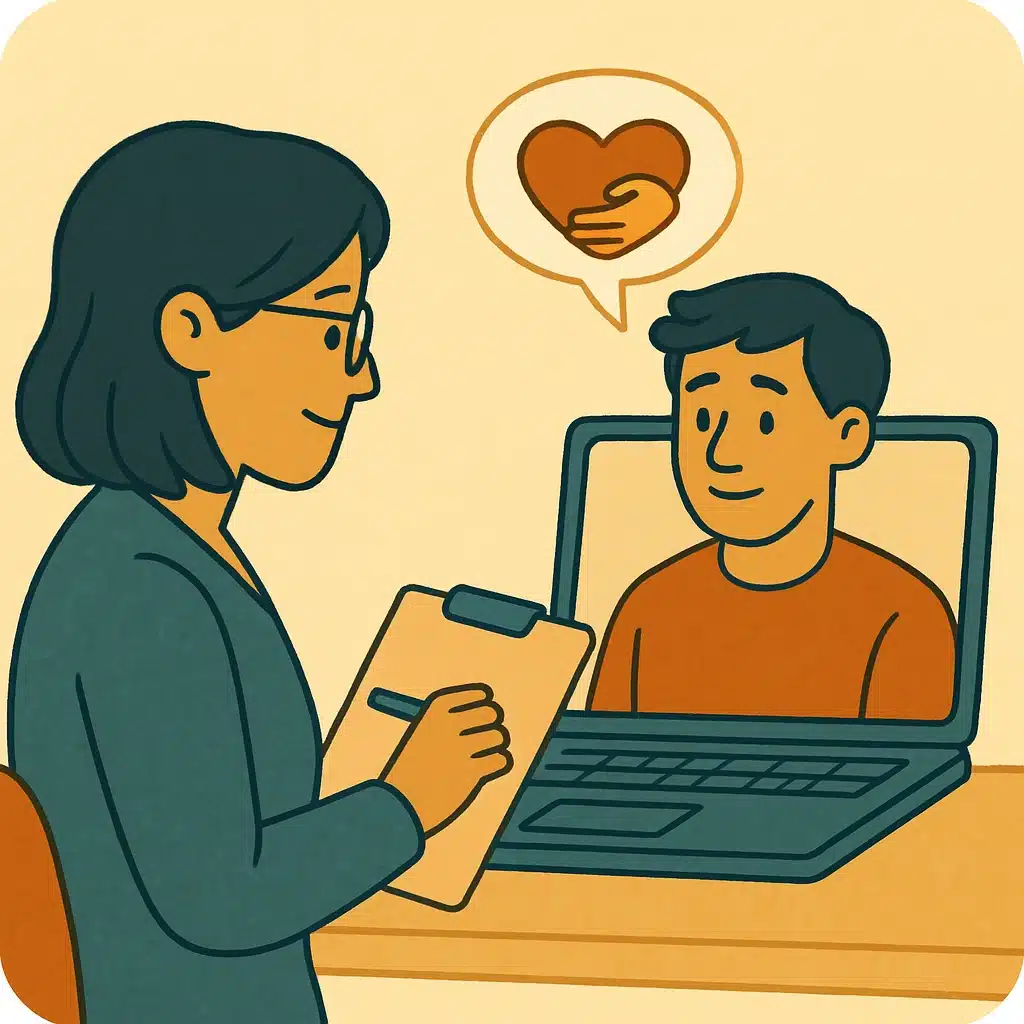Narcissistic Abuse Therapist NYC: Find the Right Support
Finding the right narcissistic abuse therapist in NYC can be a turning point in your recovery.
Anat Joseph, LCSW, PsyA, brings years of experience working with individuals impacted by narcissistic relationships. Her approach provides a safe space for healing, clarity, and long-term emotional growth.

Recognizing the Need for Therapy
Understanding the signs and tactics of narcissistic abuse helps you take the first step toward healing. This section outlines key behaviors and when to seek professional support.
Signs of Narcissistic Abuse
Narcissistic abuse can be subtle or overt. It often involves:
- Constant criticism or belittling
- Gaslighting or denial of your reality
- Emotional withdrawal as punishment
- Control over decisions, relationships, or finances
These patterns cause emotional wounds, confusion, and self-doubt. Over time, they erode self-esteem and create dependency on the narcissistic partner or parent. Abuse is a form of control and psychological harm, even when there are no physical signs.
The 4 D’s of Narcissistic Abuse
Understanding the tactics used can help you identify the abuse:
Deny – The abuser denies events or feelings.
Dismiss – Your concerns are labeled as overreactions.
Devalue – They criticize your character, work, or worth.
Discard – Sudden emotional withdrawal or abandonment.
These behaviors form a pattern of psychological manipulation and emotional control.
When to Seek a Therapist Specializing in Narcissistic Abuse in NYC
If you feel confused, emotionally drained, or unsafe, therapy can help. A therapist specializing in narcissistic abuse in NYC will recognize these dynamics quickly.
They provide tools to help you process trauma, rebuild trust in yourself, and move forward. Whether the abusive behavior comes from a partner, family member, or narcissistic parent, a trained professional can guide you through recovery.
Choosing the Right Therapist
Not every therapist has experience with narcissistic abuse. This section helps you understand what to look for and how to find a provider who fits your needs.
What Type of Therapist Should I See for Narcissistic Abuse?
Many people worry about what therapy will feel like, especially if they’ve experienced invalidation or control in past relationships. It’s normal to feel unsure or hesitant.
A good therapist will never judge you or minimize your experience. Their role is to listen, validate, and create a supportive space where you feel emotionally safe.
Look for licensed professionals trained in trauma, relational abuse, or personality disorders.
Anat Joseph, for example, is both a Licensed Clinical Social Worker and a certified Psychoanalyst with expertise in emotional abuse recovery. Modalities like psychodynamic therapy, DBT, and CBT are often used.
How to Find a Therapist (Online or Near Me)
To start your search:
- Use trusted directories like Psychology Today
- Filter by specialty: “narcissistic abuse” or “emotional abuse”
- Check credentials and treatment approaches
- Consider availability for in-person or virtual sessions
Finding someone who validates your experience and aligns with your needs is key. Therapists familiar with narcissistic personality disorder will better understand the specific challenges you face.
Best Therapist for Narcissistic Abuse – Key Traits
A qualified therapist should:
- Understand narcissistic personality disorder and emotional trauma
- Offer a non-judgmental, safe space for disclosure
- Provide structured therapy for narcissistic abuse recovery
- Encourage coping skills to regain control and emotional stability
Trust and consistency are crucial when working through the impact of a narcissistic relationship.
Narcissistic Abuse Therapist Online – Is It Right for You?
Online therapy offers flexibility and privacy. It can be a good option if:
- You’re not ready for in-person sessions
- You need access to specialized care outside your area
- You prefer the comfort of your home during recovery
Teletherapy platforms allow continuity in care with trained professionals. Remote sessions can be especially helpful if you’re still in a complicated or unsafe situation.
Does Insurance Cover Narcissistic Abuse Therapy?
Coverage depends on the provider and your plan. Many NYC therapists accept out-of-network benefits. You can:
- Ask for a “superbill” to submit to your insurer
- Check if CBT or DBT is covered
- Inquire about sliding scale fees if paying out-of-pocket
Verifying insurance options early can help reduce stress and allow you to focus on your recovery.
What to Expect in Therapy
Therapy for narcissistic abuse involves structured support, customized strategies, and a space for emotional repair. Here, we explain the methods used and how progress unfolds.

Therapy Methods for Narcissistic Abuse – What Works and Why
Therapists often use:
Cognitive Behavioral Therapy (CBT): Helps you challenge distorted beliefs
Dialectical Behavior Therapy (DBT): Teaches emotional regulation and boundaries
Psychoanalytic therapy: Explores deeper relational pattern
These methods support healing from narcissistic abuse by rebuilding thought patterns and emotional resilience. Some individuals benefit from integrating mindfulness and somatic techniques to address trauma stored in the body.

What to Expect in Recovery Therapy
Your first session is typically focused on understanding your personal history, emotional experiences, and current concerns.
The therapist may ask questions to assess your safety, identify pressing emotional needs, and start building a foundation of trust. This beginning phase helps you feel seen, heard, and supported before diving deeper into recovery work.
Therapy for narcissistic abuse is gradual. Sessions often involve:
- Validating your experience
- Identifying emotional triggers
- Practicing new coping strategies
- Reclaiming a sense of identity
Healing is not a linear process, and your therapist will adjust the approach based on your individual needs and background. Having a safe space to process your feelings can be transformative.

Core Therapy Goals: Boundaries, Identity, Clarity
Your therapist will guide you to:
- Set and maintain clear boundaries
- Rebuild a sense of self, apart from the narcissistic relationship
- Gain clarity about what abuse is and how to protect yourself
These goals help you move beyond survival and toward emotional and psychological growth. Therapy empowers you to build healthier relationships and reinforce your sense of self-worth.
Recovery Tools and Support Options
Healing extends beyond therapy sessions. This section introduces other valuable tools and support systems that can reinforce your recovery.
Where Can I Get Help for Narcissistic Abuse?
In NYC, support is available through:
- Individual therapists like Anat Joseph, LCSW, PsyA
- Community mental health clinics
- Online therapy platforms with trauma-informed specialists
Seeking help is the first step in breaking the cycle. These services are designed to meet you where you are in your healing journey.
Therapists Dealing With Narcissistic Abuse Near Me – Alternatives
If therapy isn’t accessible right away, consider:
- Support groups (online or in-person)
- Psychoeducation workshops
- Guided self-help resources from licensed professionals
These tools can offer relief and perspective while you prepare for formal therapy. Many survivors begin with self-help and transition to one-on-one work when they feel ready.

Group Therapy, Books, Podcasts, and Online Resources
Other helpful resources include:
- Group therapy focused on emotional abuse and recovery
- Books like Psychopath Free or It’s Not You
- Podcasts by professionals like Dr. Ramani or Caroline Strawson
- Online courses and forums that promote healing from narcissistic abuse
Educational resources can deepen your understanding and provide strategies to recover from narcissistic abuse. They are invaluable when dealing with narcissistic parents or rebuilding after a long-term narcissistic relationship.
Anat Joseph, LCSW, PsyA, offers a thoughtful and structured path to help you recover from narcissistic abuse.
Her therapeutic approach integrates psychoanalytic insight with trauma-informed methods, cognitive strategies, and emotional regulation techniques tailored to survivors of narcissistic relationships.
Her NYC-based practice supports clients seeking clarity, emotional healing, and personal empowerment after psychological manipulation. Whether your experience involves a partner, parent, or another relationship with a narcissist, professional support can help you heal, regain control, and move forward with strength.
